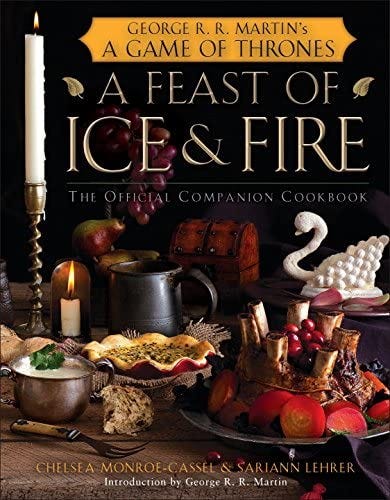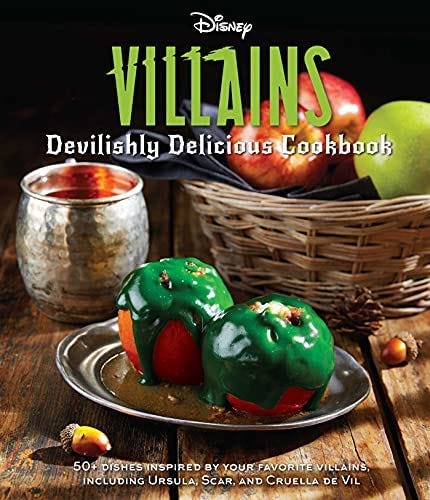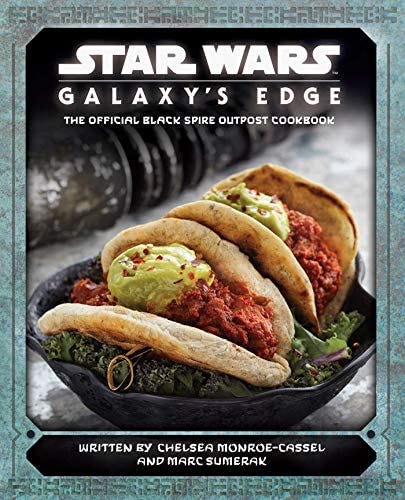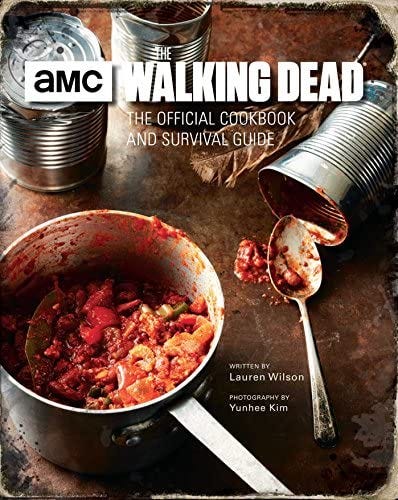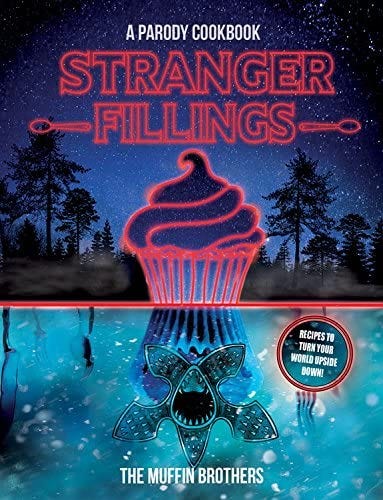Food and fandom always belonged together.
How fandom recipes and cookbooks inspired by pop culture helps humanity reconnect over food
content warning: diet culture
If essays aren’t your thing but excellent lists are, click here or scroll down to read our curated list of pop culture cookbooks for every taste…
A joke burger from Bob’s Burgers, bedroom pastrami from Seinfeld, and ratatouille from, well, Ratatouille…
If a popular movie, TV show, or video game features a particular food or drink, chances are, you can easily find a recipe to recreate it. Unofficial cookbooks and franchise-inspired recipes have become remarkably popular over the last decade, inspiring fandoms of their own; in just six years, Binging with Babish has amassed nearly 10 million subscribers, morphing from one channel into an expansive culinary universe with numerous shows and bestselling books. Through this fannish project, Andrew “Babish” Rea has become something of a celebrity chef himself, attracting high-profile collaborators from traditional food media to his company, most notably Bon Appetit alum Sohla El Waylly.
The crossover between food and fandom has been a resounding success that should surprise absolutely no one. The rise of pop culture cookbooks and culinary experiences illustrates one of my core beliefs: that fandom is ultimately an extension of our human urge to share stories, and that meaningful immersion in fictional worlds is critical to building our modern mythological canon. Authors write, then fans rewrite, remix, and build worlds however they can. Recipes are, in their way, a type of fan fiction that we can dig into with a fork and a knife.
Maybe it’s just because I love to cook, but I find the experience of sampling the cuisines of fictional worlds to be the perfect alchemy of reality and imagination. The delicate crème patisserie of a courtesan au chocolat is tangible and sensual, with the power to transport us into a dreamy Wes Anderson universe (sans fascism, hopefully). This is the kind of work and pleasure that allows humans to extend the bounds of how we relate to media and one another.
Searchlight Pictures wants YOU to make highly stylized, comedically tasteful, yet offensive-in-a-dated-way faux French ensemble film pastries.
In an era when you can easily spend thousands of dollars on conventions, theme parks, and other fandom experiences, food is universally understood, relatively accessible, and eminently practical. Family and friends may not understand the desire to wait in long lines at Comic-Con, but they would likely appreciate the opportunity to share a meal. (Unless you are a horrible cook, or making Bertie’s Bott’s earwax jelly beans, or both.)
Expressing fannishness through cooking offers more than just entertainment value; it rehabilitates our relationship with food by framing dining as a cultural practice we do for nourishment, ideally as a shared experience. In a culture where people are far too often rushed or pressured by advertising and wellness gurus into obsessive diets, reframing food as a creative art form has been a balm for me. I have become a gourmand who labors over beautiful roasts and gorgeous tarts with delight as my directive. This makes it much easier to savor and feel restored at the end of a great meal.
When I connect with other members of online fan communities over food, I know I am connected to “my people,” wherever and whoever they are. Historically, foodways and culinary identity have been determined by heritage and nationality, and even within a country by regional dishes. Today, people still often favor the dishes of their ancestors, but as globalization continues to shape international dining trends, humanity is developing new shared myths and resulting practices of passing down favored stories. As the highest-grossing media franchises of all time, it makes sense to learn how to dine like a Pokémon master or that Disney would invest in an impressive tasting menu at the $4,809 two-night experiential Star Wars: Galactic Starcruiser hotel. People aren’t trying to recreate Universal Studios’ Harry Potter theme park butterbeer for nothing. Massive media franchises have become an important cultural tie and something like a modern mythos.
Some have wisely drawn a clear parallel between fandom and faith, and how the rituals we create as fans serve a similar purpose to those of organized religions. According to Meg Hanson at Popdust, fan communities “develop their own ethos, codes of behavior, and networks of peer-mentoring” that parallel traditional faith practices.
Cooking is merely one possible element that feels ritualistic. I am always a little perversely touched by the Amazon marketing department when they put out the year’s Passover promotional item for The Marvelous Mrs. Maisel. I say perversely because, as a jaded marketing executive, I am always a little surprised when I find myself reacting so strongly to what is clearly a marketing gimmick. Media literacy was supposed to drive that susceptibility away! Still, I enjoy having a Maxwell House Haggadah, an iconic American Jewish mainstay in that iconic bright Maisel pink. It is remarkable to be able to share this Haggadah with grandparents and elders who join us for the holidays, many of whom are New Yorkers in Midge Maisel’s age group. Like the food we share, franchises like Maisel can inspire a shared cultural understanding between generations.
Unbelievably, many studios and publishers are only now establishing official cookbooks and themed food experiences for major franchises. The New York Times noted the recent success of McDonalds’ partnerships with Megan Thee Stallion and BTS as evidence of our human urge to eat donuts named after Justin Bieber.
This is not a brand new phenomenon, though when the first fandom recipe came out, I cannot exactly say. I have no concrete evidence, but I can imagine that the people who wrote hate mail to Sir Arthur Conan Doyle about Sherlock Holmes’ death (then resurrection) would certainly have tried to recreate whatever Victorian nightmare Watson was cooking up. Either way, I know for sure that pop culture food activations have existed since at least 2005. Because… reasons.

For nearly two decades before the COVID-19 pandemic, I built networks of friends online through fan communities, like Nerdfighteria and the YouTube community on Tumblr. Some of these friends became best friends, and others became partners. Many are loose connections around the globe that allow me to have friends in so many cities. These connections have more or less been in conversation with me for the past fifteen years, and breaking bread in fandom spaces, virtual or in-person, has always been a joy.
When Remarkist was founded, I was so thrilled to be immersed in real conversations with the actors who lived in my heart and imagination for so long. But more than that, I found that I could build enduring friendships in the Gilmore Girls fandom or any of my chosen fandoms. The Super Sensational Summer Spectacular, Remarkist’s first-ever summer festival, featured a series of Instagram cooking challenges and a special conversation with Larisa Kliman, creator of the Eating Gilmore recipe blog, who served as a culinary judge for the contests. Our community also had a Mrs. Maisel-themed Jell-O party, complete with all the odds and ends you’d find in an aspic.
Whether it’s a pandemic or you simply don’t get out that much, shared online food experiences can be as meaningful as an in-person dinner among friends and family. In pledging to learn 100 new recipes each year until 2030, I found that my online network helped develop a modest but enthusiastic reputation for my cooking. Many of those recipes have been driven by fandom, and some of my long-time online friends have become my real neighbors in New York City. I often invite them to my holiday table.

Food and fandom are two magical glues that hold our society together. The more they intersect, the better. Or less, if you were ever tricked into eating Turkish Delight or an earwax jelly bean. Whatever you do, remember to tip extra if House of the Dragon has influenced you so hard that you absolutely must try the “Negroni sbagliato with Prosecco in it.” (I tried it, despite not liking Negronis. It tastes like… a Negroni.)
Keep tasting and dreaming, friends.
And while you’re at it, enjoy this curated list of 40 official and unofficial fandom cookbooks across various franchises and genres…
For the small-town picnicker:
Eat Like a Gilmore: The Unofficial Cookbook for Fans of Gilmore Girls
Eat Like a Gilmore: Seasons: An Unofficial Cookbook for Fans of the Gilmore Girls Revival
For the fantasy epicurean:
A Feast of Ice and Fire: The Official Game of Thrones Companion Cookbook
The Official Harry Potter Baking Book: 40+ Recipes Inspired by the Films
Outlander Kitchen: The Official Outlander Companion Cookbook
For the cartoon connoisseur:
Avatar: The Last Airbender: The Official Cookbook: Recipes from the Four Nations
The Nightmare Before Dinner: Recipes to Die For: The Beetle House Cookbook
For the diner at the edge of the galaxy:
Star Wars: Galaxy's Edge: The Official Black Spire Outpost Cookbook
Star Wars: The Padawan Cookbook: Kid-Friendly Recipes from a Galaxy Far, Far Away
Doctor Who: The Official Cookbook: 40 Wibbly-Wobbly Timey-Wimey Recipes
For the gastronome ready to save the world:
For the survivalist snacker:
Supernatural: The Official Cookbook: Burgers, Pies, and Other Bites from the Road
Pink Soldiers and Dalgona Squid Game Cookbook: Exceptional Recipes Based on Korean TV Series
For the glutton who doesn’t stand a chance:
For the nosher looking to feed their inner NPC:
And lastly, an all-purpose fandom culinary guide:
Is your favorite fandom franchise not on this list? Well, chances are, there’s a cookbook out there for it. Search Google by the franchise name and include “cookbook.” Or find out what other Remarkist members plan to cook up this holiday season.





